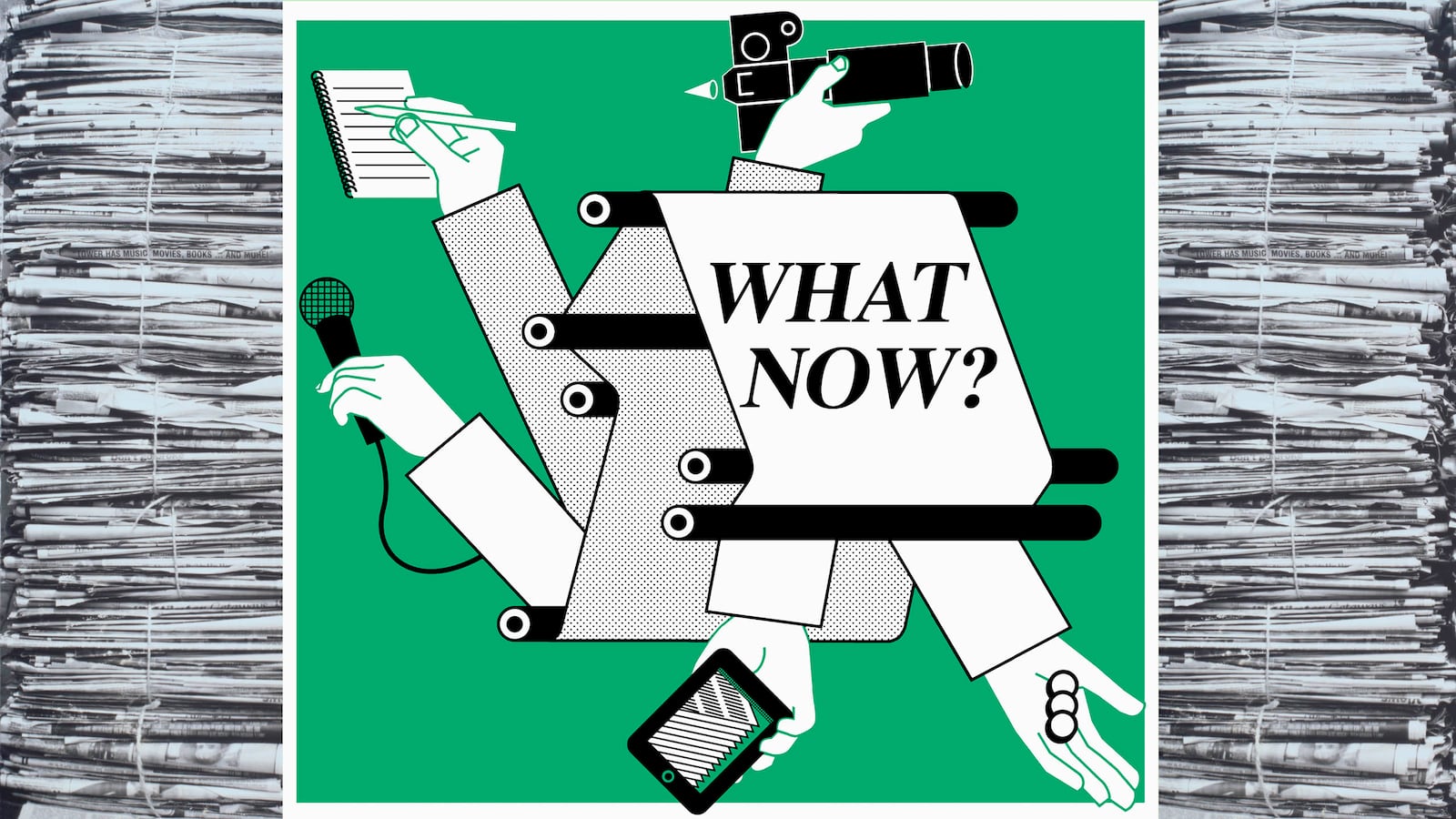The year 2018 was another tough one for those of us in the media. We saw President Donald Trump continue to refer to us as an “enemy of the people,” CNN’s New York offices evacuated because of a bomb threat, and the White House’s efforts to suspend Jim Acosta’s press credentials. The pain wasn’t limited to outlets that do straight news reporting, either. The year ended with the shutting of The Weekly Standard, the highly respected conservative (if anti-Trump) magazine.
As 2019 dawns, it might be appropriate to ponder the future of our industry. One common thread I’ve observed is that that nobody has really figured out the formula for funding smart, original content that consistently turns a profit. But to fully understand the challenges facing the industry, I wanted to talk with someone from the other side of the aisle, who has been around the block.
Fortunately, I was able to coax my editor, Michael Tomasky, into sharing his perspective and experience as a liberal opinion columnist. What follows is a lightly edited conversation about a topic near and dear to our hearts:
Lewis: Let's start by talking a bit about our backgrounds. We're both columnists here at the Beast, but since we're talking journalism, where'd you cut your teeth?
Tomasky: The New York Observer, long pre-Kushner; then The Village Voice; then New York Magazine, which takes us up thru 2003 and my move to Washington. You?
Lewis: My first two paid writing gigs were Townhall.com and AOL's Politics Daily. I was essentially pushed out of the first gig by a guy named Killingsworth (not a joke) when my boss got pushed out. And AOL abandoned Politics Daily when they overpaid Arianna Huffington $315 million. Basically, my experience with media is that it's tough out there for a writer. It's a tough industry.
Tomasky: Yeah. I caught the bare tail end of the flush days. You should've seen the expense account I racked up at the 1996 Dem convention in Chicago!
Lewis: So, I wanted to have this chat because of what happened at The Weekly Standard. Depending on whom you ask, they were either “shuttered” or “murdered.”
And my fear is that the free market (readers, that is) just do not or will not financially support quality content. The Weekly Standard was apparently OK with losing millions of dollars every year for like decades and it still didn’t survive.
Tomasky: High-quality journalism, or shall we say journalism of ideas, needs benefactors to survive. It's always been thus. As much as the internet has been so grimly relentless, this was true before the internet too.
Lewis: For conservatives, this is a little hard to swallow. There's a theory that the free market will produce superior quality content. But that's clearly not true within the domain of journalism...
Tomasky: Well, this is why you folks are wrong about the market! The market wants Mila Kunis' breasts, not your and my ideas, bub.
Lewis: First, I WILL NOT SIT HERE AND LET YOU CRITICIZE MILA KUNIS! Second, during the good old days, I assume these MSM outlets were pretty profitable. Or even back then, were they pet projects that were subsidized by donors?
Tomasky: A, that was certainly not criticism of Mila Kunis! If anything the opposite. B, no, if you're talking about magazines like the Standard—never profitable. Never. True, there is a distinction between ideological opinion magazines and the straight reporting "news" magazines. But on the left, we (liberal opinion writers/editors) have been frustrated by this for many years. On the right, you had/have Murdoch and the Unification Church, willing to lose billions because it was worth it to them to have a media property that was at the center of the action.
I used to say this to liberal donors, when I could get their ear, all the time. Murdoch doesn't mind losing $20 million (or whatever) a year on print media properties, because he considers the influence worth it. Why don't you see the world like that?
Lewis: I think conservative donors were willing to pony up because they felt that they were the only game in town. Liberals might not agree, but we feel like NPR and The Washington Post (and NBC) are already on the other side--and maybe liberal donors feel that way, too?
Tomasky: I think there is much truth to that, yes. Now, I don't think any of those outlets present an avowedly liberal interpretation of the world in the way that, say, The Washington Times presents an avowedly conservative interpretation of the world. But at the same time, I can understand that rich liberals aren't alarmed by the media constellation in the way that rich conservatives are alarmed by it. I can see that. The New York Times is not an avowedly liberal publication (I can assure you the Clintons wouldn't think so), but neither is it, from the rich liberal's point of view, the enemy.
Lewis: Well, I don't think The New York Times sets out to bias the news, but they come at it from a liberal worldview. It's just how it is. Maybe that's because they're based in New York instead of Omaha, but they have a liberal perspective and I think conservatives finally have enough alternate options that they are tuning them out.
Tomasky: But it's not avowedly liberal in the way, say, Talking Points Memo and the Huffington Post are. This goes back to the time of the Clinton impeachment, Bush v. Gore, and the post-9/11 era. These were huge events, and to liberals, huge mainstream media fails, because:
1) the impeachment of Clinton looked like a coup d'etat to us;
2) What SCOTUS did on Bush v. Gore was a clear outrage ("no precedent");
3) The way the MSM turned Dubya into Churchill and mostly accepted the premises on which the Iraq war was based.
So at that time, on our side, we saw a crying need for this thing I'm calling an avowedly liberal media. Of course times have changed a bit.
Lewis: Day in and day out, though, it's a worldview bias. How many Times staffers voted for Trump? How many attend a weekly religious service? I'm not saying they are inherently bad, but I do think they’re out of step with a lot of middle America.
Tomasky: Don't equate Trump voters with middle America, my friend! Lots of Democratic voters in middle America, too, as we just saw.
Lewis: We probably need a way to describe the Trump voter.
Tomasky: Yeah, all the media shorthand labels are problematic. But let's get back to the media issues. I have to ask: Do you think that most of what's on Fox is factually true?
Lewis: First, I think there's a huge gap between the terrific shows like Fox News Sunday and Special Report vs. Hannity.
Second, I think the big problem with cable news, in general, is selection bias. The problem isn't that they are saying false things, the problem is… which stories are they hyping or downplaying.
Tomasky: Right, like Tucker and the now-famous "should we put penises on gingerbread men?" segment.
Lewis: Tucker is a good friend, but I also have to confess that I must have missed that episode...
Tomasky: Then you should keep it that way!
Lewis: Ok, putting Fox News aside, because regardless of what you think about them, they’ve proved commercially successful. The same can’t be said about other outlets, especially online. I've talked about how these outlets have experimented with different ways to survive, including clickbait, paywalls, and rich benefactors. This last one seems to be arguably the best way for opinion outlets to survive and remain relevant. But can political journalism work without such a benefactor?
Tomasky: It's an open question. One point people often forget, as we obsess about what the internet has done to print media, is that serious political journalism has always needed benefactors. Some abolitionists wanted to start a magazine in 1865. They did. It's The Nation. It still exists. I haven't checked lately, but for like 125 years it lost money. All of them do, left and right. So benefactors for serious journalism are part of the mix, always have been.
Lewis: A few years ago, I read Paul Johnson's book Intellectuals. It profiles great thinkers, writers, opinion leaders, inventors, etc. And the one common denominator they all seemed to have in common was that someone was picking up their tab. In some cases, it was a rich spouse or lover, in other cases it was a family member. But they were all, to some degree (as I recall) leeching off of someone else.
Tomasky: Everybody! Shakespeare, Bach, you name it! Sponsors!!
Lewis: The “intellectuals” I mentioned were generally individuals—not outlets. And along those lines, I do think we might be returning to a bygone model (with a modern technological twist). For example, I think a big trend going forward is going to be crowdfunding journalism. So instead of one big benefactor, you may have hundreds or thousands. Platforms like Kickstarter and Patreon allow content creators to fund their work, so long as they can attract an audience. In some ways, I think this is an exciting and empowering development, though (like every technological shift) there will be a downside.
Tomasky: Yes, that's a good model, I think. If they can build a wall that way, surely we can support journalism that way. The only problem with that is it totally invalidates any concept of (elitism watch!) expertise. If you can raise crowd-sourced money and attract eyeballs, suddenly you're "journalist." Uh, not quite.
Lewis: I think there's an upside and a downside to this. Getting rid of gatekeepers has consequences. But I think this may be the direction the industry is heading. When everyone can broadcast their message on YouTube and Twitter, outlets become less important. You build your own audience and brand, and you don't need a printing press or TV studio to serve as the distribution mechanism.
Tomasky: I guess that's true. But I think more professional outlets will continue to exist. I don't think I see their influence waning in the next, say, five to 10 years. Maybe in 20 or 50. Of course they're already leaner than they were. But I might argue, and this is maybe not an argument a journalist is supposed to make but so be it, that the big outlets got bigger than they needed to be in those old flush days.
Ditto, the number of foreign correspondents. Yes, those were halcyon days when the Baltimore Sun was really, really great and had 15 people spread all over the world.
On the other hand, how many Western reporters really need to be based in Cairo or Tunis? 50 or 15? Maybe 15 is plenty, I don't know.
Lewis: Yes, I think it's hard for any individual shoe-leather reporter to compete with a media company that has international bureaus. But when it comes to opinion (and here, I’m including the proliferation of podcasts we have seen), I think crowdfunding has real potential. Of course, the good thing about one benefactor is that he or she might be doing it for purely altruistic reasons. But getting large numbers of people to chip in $5 a month is probably more similar to getting clicks and ratings, which means you are more subject to the perverse incentives that, essentially, are driving commentators to the right and the left.
So the big question remains: Are we destined to see opinion journalism moving further to the extremes?
Tomasky: Probably, but I think opinion journalism is a following indicator, not a leading one. The leading indicator is plain old politics. If somehow polarization were to decrease in the political sphere, it would decrease in the polemical sphere as well.
But that is probably not happening, so here we are. Yes, it's going to get much more extreme, especially in 2020, assuming (as I do) that Trump is seeking reelection. And if he wins, more extreme still. This isn't good, of course, but we should always try to remind ourselves that in terms of American history, it's not so terribly unusual.
Lewis: Good point. I think it's important to put things into historical perspective. Our politics and our journalism changed a lot in the post-world war II consensus years. You and I (and almost everybody reading) are accustomed to that era. But, in many ways, we are reverting to an earlier time. There used to be "Republican" newspapers and "Democratic" newspapers, and there were pamphleteers, and "scurrilous scribblers." And, of course, benefactors. Technology changes, but some of this is cyclical. The whole "fake news" thing could go back to the Founders. And the attacks on journalists... John Adams...
Tomasky: Those Revolutionary pamphleteers, like "Brutus," the strident anti-Federalist... just like Twitter! Without the instantaneous pile-ons, which, granted, is a difference.
Lewis: So I guess we're at the part of the discussion where we should come to some conclusions. I guess I have two questions: Where do you think this is headed as an industry, and how can I personally keep getting paid to spout my opinions?
Tomasky: I'll answer the second question first. Keep your editor happy! 😉
(Folks—I'm his editor)
Lewis: Did you receive the boxes of wine I sent over for Christmas?
Tomasky: Yes. An adequate down payment... Anyway, the bigger question...
There was an audience for the kind of journalism we do in 1865. The Nation was started to serve that audience. And there was an audience in 1913, and The New Republic was created to serve that audience. And The National Review in 1955 and so on.
So, there's long been an audience and there will always be an audience. It's not enough of an audience to make a lot of money, so it needs some people who have money who understand the importance of serious journalism. They exist. Four of them, God bless them up and down, help fund the journal I edit.
Lewis: I think there are two things that I would end with. First, until you wrapped it up, I was going to invoke this video. BUT I think that you're right. We need funders and benefactors—the kind who (mostly) let writers write. And I think we are blessed to have that. We need more of them. Thank God for them, and... Merry Christmas!
(I've said it before, and I'll say it again: Capitalism just doesn't work.)
Tomasky: And to you! Capitalism is complicated. I'm not against traffic and the demands of commerce. It's the system we live in and must live with, that's fine.
Lewis: Yes. Please sign up for the Beast Inside. Click the ads. Check out Tomasky's band. Go Mountaineers! Follow us on Twitter. And have a Happy New Year!
Tomasky: Ditto all that!









